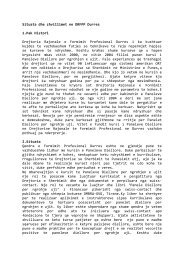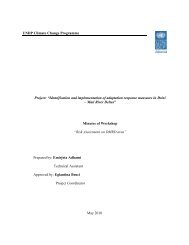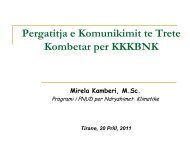Minutes of the LPAC Meeting
Minutes of the LPAC Meeting
Minutes of the LPAC Meeting
Create successful ePaper yourself
Turn your PDF publications into a flip-book with our unique Google optimized e-Paper software.
United Nations Development Programme<br />
14 May 2008<br />
Local Project Appraisal Committee, <strong>LPAC</strong> <strong>Meeting</strong><br />
Project - Identification and implementation <strong>of</strong> <strong>the</strong> adaptation response measures for<br />
Drini-Mati River Deltas<br />
<strong>Meeting</strong> participants:<br />
Beneficiary<br />
Daniela Godo, Director <strong>of</strong> Project Management Unit, Ministry <strong>of</strong> Environment,<br />
Forestry and Water Administration, Albania (MoEFWA)<br />
UNDP<br />
1. Norimasa Shimomura, Country Director<br />
2. Alma Mustafaraj, Operations Manager<br />
3. Vladimir Malkaj, Cluster Manager<br />
4. Entela Lako, Programme Officer<br />
5. Eno Ngjela, Programme Officer<br />
6. Fran Deans, UNV Programme Officer<br />
7. Bly<strong>the</strong> Fraser, Public Information Officer<br />
8. Alma Gjoni, Programme Associate<br />
9. Elvita Kabashi, Programme Associate<br />
10. Xhesi Mane, Programme Associate<br />
11. Jakob Schemel, Junior Programme Officer<br />
12. Carlo Benedetti, UNDESA/UNDP Capacity Development Specialist<br />
13. Ermira Fida, Programme Manager<br />
14. Mirela Kamberi, National Project Coordinator<br />
15. Englantina Demiraj, Project Team Leader<br />
16. Lirim Selfo, Project Manager<br />
17. Klodiana Marika, National Technical Expert<br />
18. Violeta Zuna, Project Coordinator<br />
19. Odeta Zheku, Public Information Assistant<br />
20. Melita Leka, Administrative Finance Assistant<br />
21. Besa Menzelxhiu, Administrative Finance Assistant<br />
Partner Organization<br />
Mihallaq Qirjo, Albania Country Office Director, Regional Environmental Center<br />
(REC)<br />
Albania
United Nations Development Programme<br />
Location and timing<br />
The meeting took place at <strong>the</strong> UNDP Country Office on 5 May 2008 between 10:00 –<br />
11:00.<br />
Materials distributed<br />
The final version <strong>of</strong> <strong>the</strong> project document was circulated prior to <strong>the</strong> meeting;<br />
Handouts <strong>of</strong> <strong>the</strong> project presentation were distributed at <strong>the</strong> meeting.<br />
Opening remarks<br />
Norimasa Shimomura opened <strong>the</strong> Local Project Appraisal Committee <strong>Meeting</strong> for<br />
“Identification and implementation <strong>of</strong> <strong>the</strong> adaptation response measures for Drini-Mati<br />
River Deltas”, part <strong>of</strong> <strong>the</strong> Climate Change Programme. He considered <strong>the</strong> meeting to be a<br />
final and overall assessment on <strong>the</strong> project’s activities, management arrangements as well<br />
as a last chance for comments and questions. He pointed out that <strong>the</strong> project was<br />
prepared in compliance with GEF policies and procedures, not leaving room for much<br />
flexibility.<br />
Presentation <strong>of</strong> <strong>the</strong> Project<br />
The project was presented by Climate Change Programme Manager, Ermira Fida,<br />
starting with a general overview <strong>of</strong> Climate Change in general, as <strong>the</strong> an international<br />
challenge <strong>of</strong> <strong>the</strong> 21st Century and moving to Climate Change as a national issue,<br />
expected negative impacts in different sectors and <strong>the</strong> need for adaptation and mitigation<br />
activities. The project itself was described, starting with <strong>the</strong> steps from <strong>the</strong> initial idea<br />
which came from <strong>the</strong> previous climate change studies such as Albania’s First National<br />
Communication and Technology Needs Assessment towards <strong>the</strong> PDF Block A (Project<br />
Development Facility) and <strong>the</strong>n to MSP (Medium Size Project) formulation and approval<br />
making it <strong>the</strong> first adaptation project under <strong>the</strong> SPA (Strategic Priorities for Adaptation)<br />
in <strong>the</strong> Region. The process was labour intensive due to a shift <strong>of</strong> <strong>the</strong> Global Environment<br />
Facility (GEF) Strategic Programme (GEF-3 to GEF-4), as well as national barriers and<br />
gaps.<br />
Ms. Fida explained <strong>the</strong> budget sources <strong>of</strong> <strong>the</strong> project: GEF grant; Government <strong>of</strong> Albania<br />
– Ministry <strong>of</strong> Environment, Forestry and Water Administration cash and in kind<br />
Albania
United Nations Development Programme<br />
contributions; and UNDP Albania. The Government <strong>of</strong> Albania and REC will provide<br />
parallel financing.<br />
The expected duration <strong>of</strong> <strong>the</strong> project is four years and <strong>the</strong> selected project site area is <strong>the</strong><br />
Drini Mati River Delta, selected based on <strong>the</strong> following criteria:<br />
Significant biodiversity values;<br />
Internationally recognized area;<br />
Critical vulnerable region <strong>of</strong> <strong>the</strong> country from <strong>the</strong> ecosystem point <strong>of</strong> view;<br />
Priority area for development (MDG Regional Report <strong>of</strong> Lezha).<br />
Several Projects/Programmes on <strong>the</strong> ground: EU-Environmental Legislation and<br />
Planning for Albania (ELPA); World Bank projects: Integrated Coastal Zone<br />
Management (ICMZ), Natural Resources Development (NRDP), and<br />
International Development Association, Integrated Water and Ecosystem<br />
Management Project (IDA-IWEM), REC-Small Grants Programme, GEF-Small<br />
Grants Programme, but none take into account climate related threats.<br />
Areas <strong>of</strong> <strong>the</strong> country that are most vulnerable to climate change and that would benefit<br />
from adaptation measures have been identified and prioritized though broad based<br />
stakeholder consultation as well as: Analysis carried out in Albania, as part <strong>of</strong> Albania’s<br />
First National Communication, Technology Needs Assessment; and Albania’s Second<br />
National Communication. The area given <strong>the</strong> highest priority is <strong>the</strong> entire Drini cascade<br />
extending from inland Kukes to <strong>the</strong> Drini delta.<br />
Ms. Fida highlighted <strong>the</strong> overall development goal <strong>of</strong> this medium size project: to<br />
establish a mechanism that ensures government strategies and actions address <strong>the</strong><br />
negative effects <strong>of</strong> climate change.<br />
The analysis undertaken at a national scale (FNC), regional scale covering <strong>the</strong> coastal<br />
zone (TNA) and at <strong>the</strong> level <strong>of</strong> <strong>the</strong> entire Drini cascade extending from inland Kukes to<br />
<strong>the</strong> Drini delta (SNC) have however been fundamental in prioritizing, <strong>the</strong> area where<br />
adaptation to climate change should be taken into account following a rigorous<br />
methodology and process.<br />
The overall development goal <strong>of</strong> this medium size project is to assist Albania in<br />
establishing a mechanism by which strategies to moderate, cope with, and take advantage<br />
<strong>of</strong> <strong>the</strong> consequences <strong>of</strong> climate change are enhanced, developed, and implemented.<br />
The presentation <strong>the</strong>n focused on <strong>the</strong> three project outcomes, <strong>the</strong>ir outputs, and activities,<br />
highlighting that <strong>the</strong> third outcome is standard for a medium size project. It was stated<br />
also that given <strong>the</strong> crosscutting nature <strong>of</strong> <strong>the</strong> project, and <strong>the</strong> fact that <strong>the</strong> success <strong>of</strong> this<br />
Albania
United Nations Development Programme<br />
project depends on <strong>the</strong> engagement <strong>of</strong> <strong>the</strong> stakeholders in <strong>the</strong> process, <strong>the</strong> project team in<br />
<strong>the</strong> Climate Change Programme has worked in close cooperation with local government<br />
units, and o<strong>the</strong>r interested parties.<br />
An overview <strong>of</strong> <strong>the</strong> management structure <strong>of</strong> <strong>the</strong> project was explained, integrating <strong>the</strong><br />
medium size project into <strong>the</strong> Climate Change Umbrella Programme, built around three<br />
main pillars: Green House Gas (GHG) inventory, GHG mitigation and Vulnerability and<br />
Adaptation.<br />
Regarding project risk management, it was mentioned that risks were identified and a<br />
strategy provided, but it is not final and will be re-evaluated during <strong>the</strong> project’s<br />
inception phase.<br />
Project monitoring and evaluation will be conducted in accordance with established<br />
UNDP and GEF procedures by <strong>the</strong> project team and <strong>the</strong> UNDP Country Office, with<br />
support from <strong>the</strong> UNDP/GEF Regional Coordination Unit in Bratislava. Also, <strong>the</strong><br />
Logical Framework Matrix provides performance and impact indicators for project<br />
implementation along with <strong>the</strong>ir corresponding means <strong>of</strong> verification.<br />
Regarding <strong>the</strong> project implementation arrangements, MoEFWA will execute <strong>the</strong> project<br />
under <strong>the</strong> UNDP National Execution modality (NEX) and a National Project Director<br />
will be delegated by <strong>the</strong> Executing Agency.<br />
Questions and Comments from participants:<br />
- One <strong>of</strong> <strong>the</strong> questions was if <strong>the</strong> baseline methodology <strong>of</strong> this project could be used for<br />
o<strong>the</strong>r adaptation projects in o<strong>the</strong>r sectors.<br />
Answer: The First and Second National Communication identified <strong>the</strong> sectors that would<br />
be negatively affected by climate change. In <strong>the</strong> case <strong>of</strong> biodiversity protection,<br />
adaptation measures aim to ensure that natural ecosystems are able to respond to climate<br />
change, by reducing or removing existing pressures. The current baseline <strong>of</strong>fers several<br />
opportunities to integrate adaptation. Moreover, several planning and programming<br />
exercises aimed at streng<strong>the</strong>ning environmental sustainability have taken place in <strong>the</strong><br />
region as well as an overall move towards fur<strong>the</strong>r decentralization <strong>of</strong> responsibilities to<br />
<strong>the</strong> Regional Administration. O<strong>the</strong>r sectors that would be negatively affected by climate<br />
change include natural ecosystems and energy. Although <strong>the</strong> baseline methodology for<br />
<strong>the</strong> energy sector (exploitation <strong>of</strong> Hydro resources) is being treated separately, given its<br />
Albania
United Nations Development Programme<br />
complexity. A concept note on renewable energy resources has already been submitted to<br />
<strong>the</strong> donors.<br />
- Questions followed concerning regional activities and collaboration with local and<br />
central government bodies.<br />
Answer: A package <strong>of</strong> amendments to sustainable development activities and<br />
programmes in <strong>the</strong> in <strong>the</strong> zones surrounding protected areas in <strong>the</strong> Drini Mati River<br />
Deltas will be provided as part <strong>of</strong> <strong>the</strong> project in cooperation with relevant national<br />
stakeholders. Fur<strong>the</strong>rmore, it will be determined how existing region-wide programmes<br />
can be modified by <strong>the</strong> integration <strong>of</strong> specific adaptation response measures. For this<br />
purpose, a series <strong>of</strong> technical workshops followed by round table discussions and<br />
bilateral meetings at <strong>the</strong> policy level are envisaged. A matrix <strong>of</strong> stakeholders has already<br />
been developed and will be updated and reviewed accordingly during <strong>the</strong> process.<br />
- A question covered information on <strong>the</strong> existence <strong>of</strong> measurable indicators to project<br />
results.<br />
Answer: The project document provides objectively verifiable indicators and during <strong>the</strong><br />
inception phase <strong>the</strong> indicators might be revised accordingly.<br />
-A comment was made regarding <strong>the</strong> importance <strong>of</strong> gender equality and <strong>the</strong> difficulty <strong>of</strong><br />
providing its relevance given <strong>the</strong> technical background <strong>of</strong> this specific project and <strong>of</strong><br />
environmental projects in general.<br />
The project team said that <strong>the</strong> issue will be considered during <strong>the</strong> inception phase <strong>of</strong> <strong>the</strong><br />
project.<br />
-Ano<strong>the</strong>r comment emphasized <strong>the</strong> importance <strong>of</strong> <strong>the</strong> standard letter <strong>of</strong> agreement<br />
between UNDP and <strong>the</strong> Government for <strong>the</strong> provision <strong>of</strong> support services, given that <strong>the</strong><br />
project will be executed under NEX modalities.<br />
Clarification was asked regarding project budget, allocated resources and parallel c<strong>of</strong>inancing<br />
activities.<br />
- A last comment was made regarding <strong>the</strong> communication strategy and <strong>the</strong> development<br />
<strong>of</strong> knowledge products as provided under outcome three. Given <strong>the</strong> technical and<br />
scientific background <strong>of</strong> <strong>the</strong> project, an effective communication strategy will be<br />
essential. The project team was encouraged to cooperate and make use <strong>of</strong> UNDP Public<br />
Information Unit.<br />
Albania
United Nations Development Programme<br />
The meeting was closed by thanking everyone for <strong>the</strong>ir participation and feedback.<br />
Follow up issues:<br />
Receive Delegation <strong>of</strong> Authority (DOA) letter;<br />
Enter <strong>the</strong> Project Budget in ATLAS;<br />
Duly sign <strong>the</strong> Project Document; and<br />
MSP start up implementation – June 2008.<br />
Conclusion<br />
The <strong>LPAC</strong> approved <strong>the</strong> project.<br />
Albania






